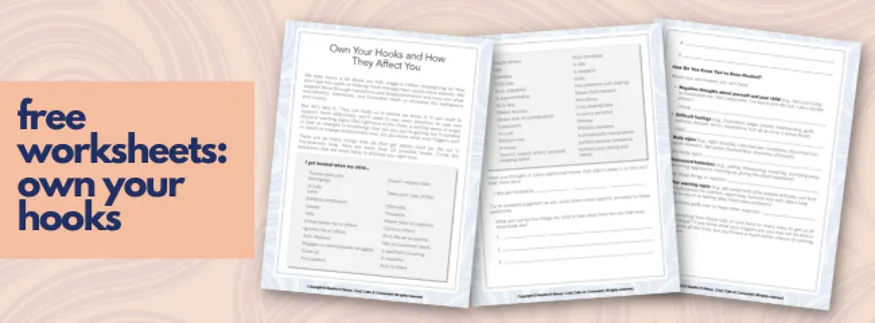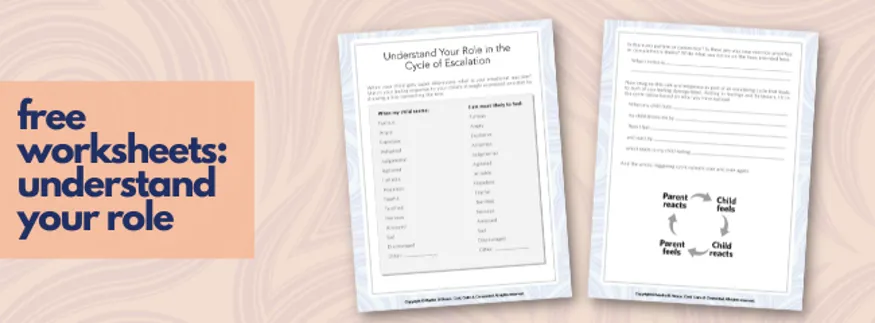Taking Charge Of Your Emotions: Strategies for Keeping It Together When Kids Fall Apart

We all make up stories in our heads to explain the motivation of others. Maybe our story is that the guy who is driving too slowly in front of us is being a jerk. We start getting hot under the collar and feel increasingly irritated by how inconsiderate he is and how slow he is going.
But here’s a different story: Perhaps this rude driver has just gotten terrible news and is having trouble focusing on the road. If we knew that, we would calm down a little and even wish him well on the way to his destination. When we feel upset, we are much more likely to tell ourselves that the other person is somehow messing with us on purpose. Then, perhaps not surprisingly, we feel—and act—even more distressed. Maybe we start pounding on the horn or swerve around him dangerously. We make up stories about the motivation of complete strangers to help us make sense of our uncomfortable reactions to them and their actions.
And, of course, perhaps with a greater degree of confidence, we also tell ourselves all kinds of tales about why our beloved kids are driving us nuts. But here’s the thing: It really doesn’t matter how accurate the story is; what’s more important is the way it determines our response. If your story contributes to the escalation of a conflict, you’ve got the wrong one—I promise.
Before you can feel in control during that maddening and recurrent struggle, you will need to pay better attention to yourself and understand your own story. Instead of asking, as many parents do, “Why does my child behave this way?” how about first considering this question: “Why am I getting so hooked by that behavior?”
Try filling out these worksheets from Cool, Calm & Connected to learn more about what kinds of behaviors are most triggering for you and how to know you’ve gotten hooked.
But here’s a different story: Perhaps this rude driver has just gotten terrible news and is having trouble focusing on the road. If we knew that, we would calm down a little and even wish him well on the way to his destination. When we feel upset, we are much more likely to tell ourselves that the other person is somehow messing with us on purpose. Then, perhaps not surprisingly, we feel—and act—even more distressed. Maybe we start pounding on the horn or swerve around him dangerously. We make up stories about the motivation of complete strangers to help us make sense of our uncomfortable reactions to them and their actions.
And, of course, perhaps with a greater degree of confidence, we also tell ourselves all kinds of tales about why our beloved kids are driving us nuts. But here’s the thing: It really doesn’t matter how accurate the story is; what’s more important is the way it determines our response. If your story contributes to the escalation of a conflict, you’ve got the wrong one—I promise.
Before you can feel in control during that maddening and recurrent struggle, you will need to pay better attention to yourself and understand your own story. Instead of asking, as many parents do, “Why does my child behave this way?” how about first considering this question: “Why am I getting so hooked by that behavior?”
Try filling out these worksheets from Cool, Calm & Connected to learn more about what kinds of behaviors are most triggering for you and how to know you’ve gotten hooked.
From this vantage point, it’s little astonishing to realize how many different childish behaviors arouse strong feelings for us. Knowing your own story is a great start for helping you learn how to feel regulated more often.
We have to make up stories about what someone else might be thinking because we can’t see into their minds. But our superpower of empathy offers us lots of information about how someone we care about is feeling. Indeed, we experience our child’s fear, anger, or joy in our bodies, as if these emotions were our own. Feelings are pretty contagious that way. Though your child may not be able to verbalize it, your child is tracking your emotional state all of the time. Together, you are learning a lifelong feelings-dance for just the two of you.
This is both good news and bad news. It is great to be empathic and to raise a sensitive kid. On the other hand, you have to be aware of how you play a major role in an emotionally-escalating situation with your child. It really does take two. The following exercise helps you see how your patterns of emotionally responding to your child contribute to a triggering cycle of interaction.
We have to make up stories about what someone else might be thinking because we can’t see into their minds. But our superpower of empathy offers us lots of information about how someone we care about is feeling. Indeed, we experience our child’s fear, anger, or joy in our bodies, as if these emotions were our own. Feelings are pretty contagious that way. Though your child may not be able to verbalize it, your child is tracking your emotional state all of the time. Together, you are learning a lifelong feelings-dance for just the two of you.
This is both good news and bad news. It is great to be empathic and to raise a sensitive kid. On the other hand, you have to be aware of how you play a major role in an emotionally-escalating situation with your child. It really does take two. The following exercise helps you see how your patterns of emotionally responding to your child contribute to a triggering cycle of interaction.
Discover over 50 Worksheets & Interventions for Effective Co-regulation

Decades of research on human development conclude that our kids learn how to self-soothe only after having plenty of experience with the supportive engagement of a caring adult. They can’t calm down unless we show them how it’s done.
When you learn to become a co-regulator for your child, you get to be the loving parent you aspire to be and have a child who feels better. It’s a win-win!
Over 50 worksheets and interventions will help you to:
When you learn to become a co-regulator for your child, you get to be the loving parent you aspire to be and have a child who feels better. It’s a win-win!
Over 50 worksheets and interventions will help you to:
- Understand your triggers and how to manage them
- Discover your role in escalating conflict
- Respond more intentionally
- Make use of “adult time out”
- Build safe communities of support
- Learn how to ask for help and apologize
- Breathe, ground, and regulate together before and during a conflict







